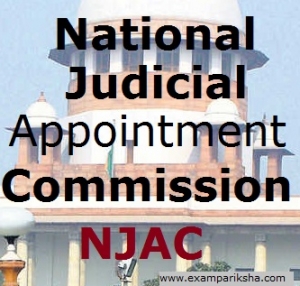The National Judicial Appointments Commission (NJAC) has been established by the 121st constitutional Amendment Bill, 2014. NJAC is a proposed body responsible for appointment and transfer of judges to the higher judiciary in India.
The present Collegium system of appointing the judges of Supreme Court and 24 High Courts will be replaced with judicial appointments commission wherein the executive will also have a say in appointing the judges.
Along with the National Judicial Appointments Commission Bill, 2014 was introduced in the Lok Sabha on August 11, 2014 by the Minister of Law and Justice, Mr. Ravi Shankar Prasad, a new article, Article 124 A, (which provides for the composition of the NJAC) is also be inserted into the Constitution.
The NJAC Bill provides for the procedure to be followed by the NJAC for recommending persons for appointment as Chief Justice of India and other Judges of the Supreme Court (SC), and Chief Justice and other Judges of High Courts (HC). The bill also seeks changes in articles 124,217,222 and 231.
The 121st Constitution Amendment Bill stipulates amendments to Articles 124 (2) and 217 (1), which deal with the appointment of judges in the Supreme Court and the High Courts, respectively. Under the 121st amendment, every judge in the Supreme Court and the High Courts would be now appointed by the President in consultation with the National Judicial Appointments Commission (NJAC).
Composition of NJAC (National Judicial Appointments Commission)
The National Judicial Appointments Commission will be a six member body composed of the following members:
- Chief Justice of India – (will be the ex-officio Chairperson)
- Two other senior judges of the Supreme Court, next to the Chief Justice of India – (ex officio members)
- The Union Minister of Law and Justice – (ex-officio)
- Two eminent persons shall be nominated for a period of three years and shall not be eligible for re-nomination. – (to be nominated by a committee consisting of the Chief Justice of India, Prime Minister of India and the Leader of opposition in the Lok Sabha or the Leader of single largest Opposition Party in Lok Sabha), provided that of the two eminent persons, one person would be from the Scheduled Castes or Scheduled Tribes or OBC or minority communities or a woman.
Functions of NJAC (National Judicial Appointments Commission)
The functions of the NAtional Judicial Appointments Commission (NJAC) will be, to recommend candidates for appointment as Chief Justice of India, Judges of the Supreme Court, Chief Justices of High Courts and other Judges of High Courts. The NJAC will also play its role in transfer of Chief Justices and other Judges of High Courts from one High Court to any other High Court. The chief task of NJAC will be to ensure that the persons recommended are of ability and integrity.
Analysis of the National Judicial Appointments Commission (NJAC)
Under the present Collegium system, the Chief Justice of India consult the four senior most judges of the Supreme Court for appointments to the Supreme Court and two senior-most judges for appointments to high courts.
With the Judicial Appointments Commission (NJAC), it is expected that transparency in judicial appointments will be seen in the highest courts. Also, it would end the highest judiciary’s two-decade-old grip over the appointments of judges through the collegium system.
Hence, the National Judicial appointments commission gives the executive an equal role in the appointment of judges to the highest judiciary.
Concerns and Issues regarding National Judicial Appointments Commission (NJAC)
There are various contentions regarding the National Judicial Appointments Commission. The following points summarize the issues and concerns related to NJAC.
- Through the NJAC Bill the parliament had “altered the basic structure of the Constitution” and encroached into judicial independence. Given here that, independence of judiciary includes elimination of the political influence even at the stage of appointment of a judge which is alleged to be violated.
- The NJAC takes away the collective opinion of the Chief Justice of India and the two senior most Judges of the Supreme Court of India.
- Although the six-member Judicial Commission has the CJI as chairperson and two senior most Supreme Court judges as members, there was no “primacy” for their opinion which can be vetoed by any two non-judicial members on the panel.
- On the contrary, under the present Collegium system, the Chief Justice of India would be consulting the four senior most judges of the Supreme Court for Supreme Court appointments and two senior-most judges for high court appointments, hence, having primacy of their collective opinion.





